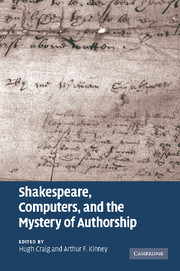Book contents
- Frontmatter
- Contents
- List of figures
- List of tables
- Notes on contributors
- Preface and acknowledgments
- 1 Introduction
- 2 Methods
- 3 The three parts of Henry VI
- 4 Authoring Arden of Faversham
- 5 Edmond Ironside and the question of Shakespearean authorship
- 6 The authorship of The Raigne of Edward the Third
- 7 The authorship of the Hand-D Addition to The Book of Sir Thomas More
- 8 The 1602 Additions to The Spanish Tragedy
- 9 Transforming King Lear
- Conclusion
- Appendix A Plays in the corpus
- Appendix B A list of 200 function words
- Glossary
- Index
Preface and acknowledgments
Published online by Cambridge University Press: 06 January 2010
- Frontmatter
- Contents
- List of figures
- List of tables
- Notes on contributors
- Preface and acknowledgments
- 1 Introduction
- 2 Methods
- 3 The three parts of Henry VI
- 4 Authoring Arden of Faversham
- 5 Edmond Ironside and the question of Shakespearean authorship
- 6 The authorship of The Raigne of Edward the Third
- 7 The authorship of the Hand-D Addition to The Book of Sir Thomas More
- 8 The 1602 Additions to The Spanish Tragedy
- 9 Transforming King Lear
- Conclusion
- Appendix A Plays in the corpus
- Appendix B A list of 200 function words
- Glossary
- Index
Summary
This project began in 2001 when one of the editors, Arthur Kinney, spent a period as a research visitor at the University of Newcastle in New South Wales, where the other editor, Hugh Craig, works. A collaborative project was hatched. It was to combine Kinney's knowledge of Shakespeare with Craig's familiarity with numbers, and thus pioneer a Shakespearean computational stylistics. Kinney would supply the questions and Craig would furnish numerical results. In what they jointly wrote they would keep in mind an audience that had no interest in arcane statistics or in interminable tables of figures. Authorship would be the core of the enterprise. Coworkers were recruited from Kinney's Massachusetts Center for Renaissance Studies in Amherst, as was a programmer and research assistant from Craig's Centre for Literary and Linguistic Computing in Newcastle, so it has been an American–Australian and a Center–Centre collaboration.
Computational stylistics stems from the work of John Burrows, beginning in the 1980s. He was convinced that the smallest elements of literary language (down to very common grammatical words such as and and but) had things of stylistic interest buried in them, and he sought to bring latent patterns in their use to light, through multivariate statistical procedures analysing the word-count information from large tracts of machine-readable text. The new method revealed a patterning that pervaded all levels of language and could be measured. Readers, however perceptive they may be, have only one lifetime to read in, and remember what they read selectively and imperfectly.
- Type
- Chapter
- Information
- Shakespeare, Computers, and the Mystery of Authorship , pp. xv - xxPublisher: Cambridge University PressPrint publication year: 2009



